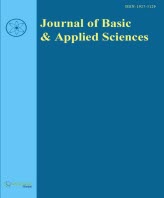jbas
|
|
|
Abstract: A field experiment was conducted during 2014-15, aiming to observe the efficiency of irrigation methods and plastic mulch on the yield and crop productivity of Okra. Okra seeds (cv. Subzpari) were grown on ridges with plastic under two different irrigation methods i.e. Every Furrow Irrigation (EFI) and Alternate Furrow Irrigation (AFI). The soil physical properties of ridges being affected by plastic mulched were analyzed before sowing and after harvesting. The results revealed that dry density of soil decreased by 0.03 g cm-3 and 0.04 g cm-3 for AFI and EFI methods, respectively. The total volume of irrigation water applied under AFI method (2169.70 m3 ha-1) was calculated to be half of the total irrigation water applied to EFI method (4340.91 m3 ha-1). Yield obtained under EFI method was 8518 kg ha-1 which was 10.5% greater than yield obtained under AFI method (7621 kg ha-1) and 31.40% when compared with traditional method. The crop water productivity (CWP) for AFI method (3.51 kg m-3) was calculated to be greater than CWP obtained under EFI method (1.96 kg m-3). The study concluded that both EFI and AFI methods, under plastic mulched ridges practices were beneficial to increase the crop yield with improved crop water productivity. Keywords: Irrigation method, Okra Crop, Plastic Mulching, Yield, Water Productivity. Download Full Article |
|
|
|
Abstract: A new trend of socializing networks such as Facebook and WhatsApp has emerged among university students for academic purpose. This study aims to analyze the impact and usage of Facebook and WhatsApp for academic activities. A quantitative research method has been used in the study. This survey was conducted at eight major private universities of Karachi, Pakistan. The sample size of the study is three hundred students. The survey reveals an interesting fact that frequent use of Facebook and WhatsApp doesn’t affect studies but it enhances collaborative learning among university students. Students perceive that Facebook is more helpful for receiving information regarding class activity and lecture than WhatsApp. Keyword: New Media, Social Media, Collaborative Learning, Facebook, WhatsApp, Social media and learning, Universities, Academics. Download Full Article |
|
|
|
Abstract: Crime and geographical accessibility has very special relationship, if monitored on appropriate time it could resolve many complex issues of the crime dynamics. Karachi being the largest city of Pakistan is also very high in the intensity of street crimes that often has very close relationship with the network of the roads. This paper will assess the potential of Geographical Information Systems (GIS) for the analysis of crime pattern and its relationship with the road network in Karachi that would be beneficial for various crime agencies. Present research aims to provide a collective set of methods and techniques for geospatial analysis and 3D mapping of crime scenes. After identification of Hotspots assessment of relationships between robbery or snatching clusters and their spatial neighborhood is initiated by including the urban milieu. For obtaining the desired target copious geospatial data as well as a three-dimensional model is included for analysis. The combined and mutual effort of crime mapping methods with modern 3D modelling helps to facilitate on the spot clutch of multipart spatial phenomena in mapping of crime, and fruitful for both, the communal and responsible decision makers. Keywords: GIS, Geo-spatial 3-D modeling, Crime Analysis, Hotspot. Download Full Article |
|
|
|
Abstract: A major challenge in post-harvest protection of chilies is its rapid drying to prevent quality deterioration as a result of fungal contamination. The speed and efficiency of drying is crucial as the improper and prolonged drying may eventually initiate the buildup of mycotoxins. This research demonstrated levels of aflatoxin in samples at different stages of drying with the objective to assess the efficiency of the common practice of on-farm sun drying in Pakistan. The results indicated that there was no significant pre-harvest contamination of aflatoxins in chilies grown at different locations under study. Sun drying of the harvested chilies over a post drying stage reduced average moisture content from 69.70% to 9.87%, but also led to a gradual increase in the level of aflatoxins. The correlation between the observed increase in aflatoxin levels and the length of the drying period was found to be statistically significant (P<0.05) at all the locations investigated. The implications of the findings are discussed in relation to optimizing the post-harvest drying process to minimize the levels of aflatoxin in chilies. Keywords: Red Chilies, Aflatoxin contamination, Post-harvest practices, Moisture content. Download Full Article |



